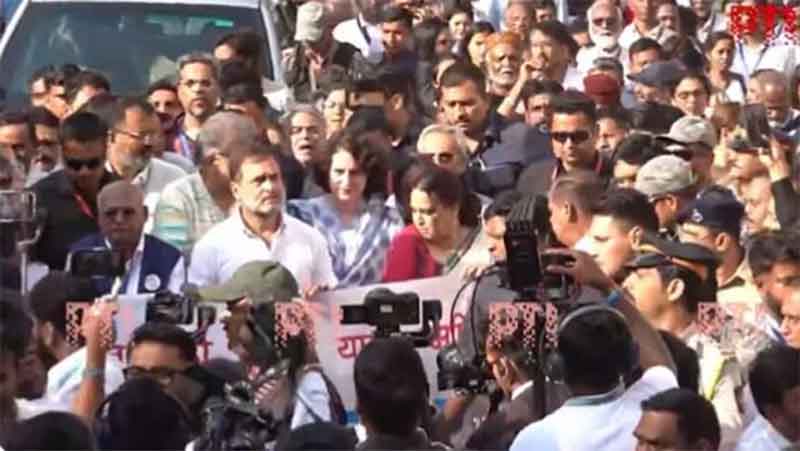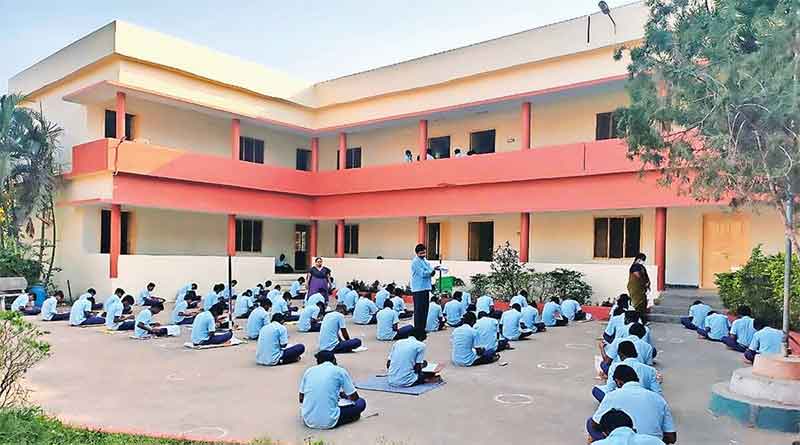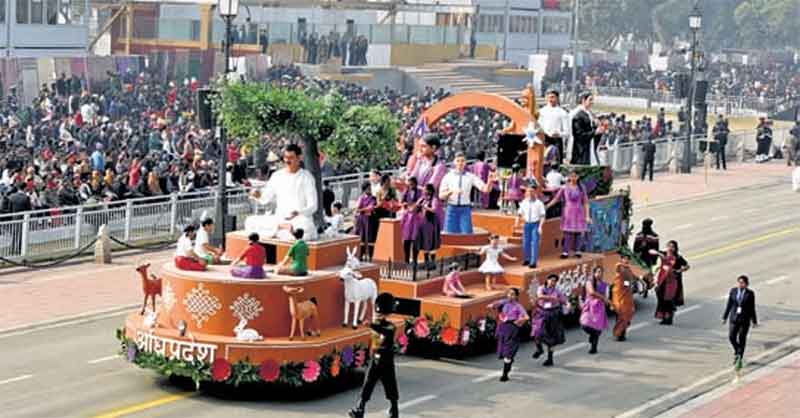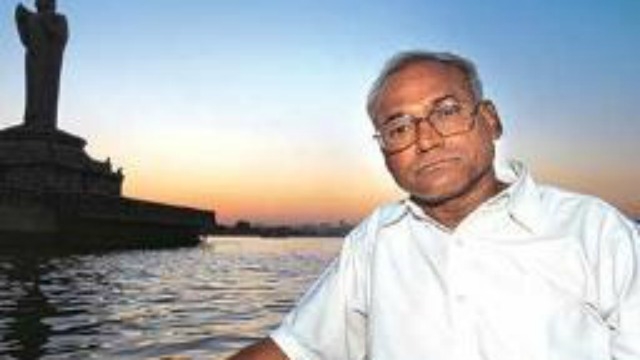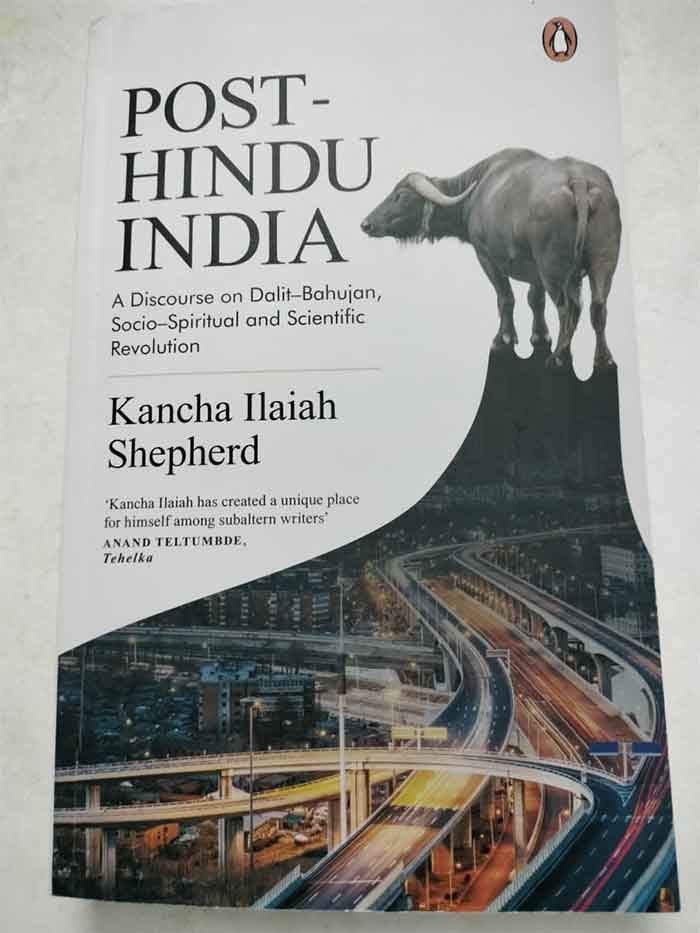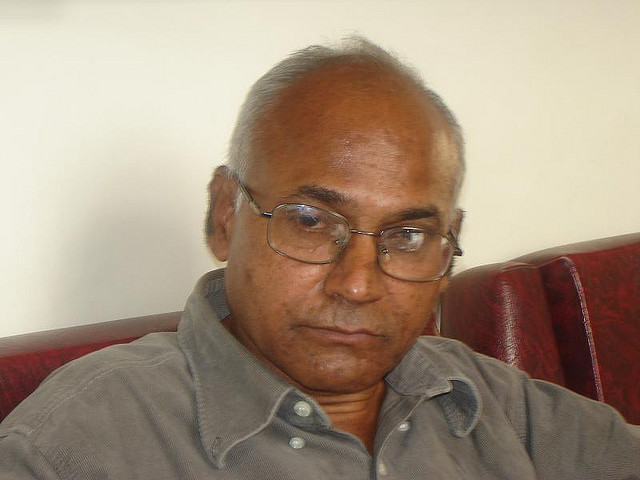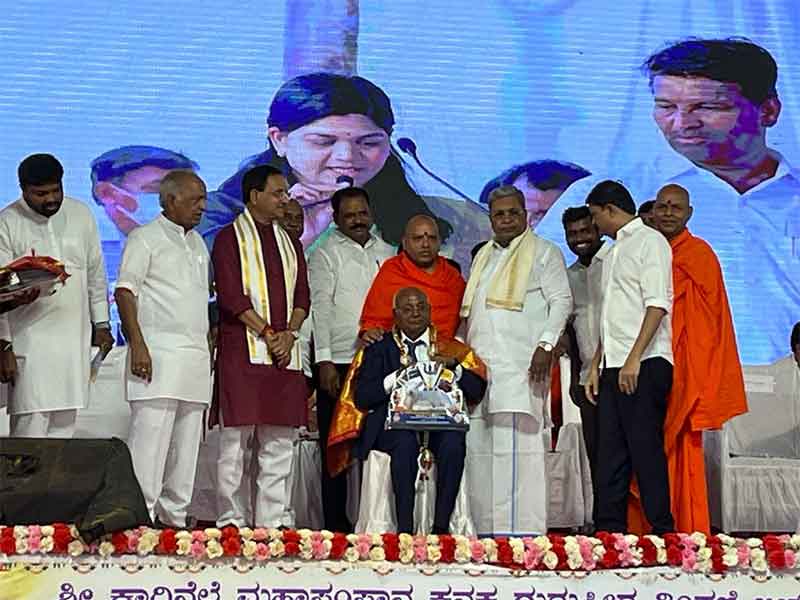
On 13 January, 2024 the Kanaka Guru Pitta headed by Sri. Niranajananda Swami in a massive public meeting attended by the Karnataka Chief Minister Mr. Siddaramaiah, central minister Mr. Bhagwanth Khuba, Planning and Urban Development Minister of Karnataka Mr Bairati Suresh and other Pittadhipatis, amidst thousands of shepherds (Kurubas) from all over the state, presented “The Sun of Our Community” (the Halumatha Bhaskara) title award to Kancha Ilaiah shepherd. The award consisted of a plaque and Rupees 50,000. The plaque read, ” We wish him the best by awarding the title Halumatha Bhaskara in recognition of his achievements as a strong voice against the religious persecution of the Indian aborigines and against caste oppression”.
Siddaramaiah congratulated him for doing great intellectual service to the oppressed and exploited masses of India.
SHEPHERD’S ACCEPTANCE SPEECH.
At the outset I am extremely happy to have been given this unusual award, called Halumatha Bhaskara) “The Sun of Our Community”.
I thank the Kanaka Guru Pitta for honouring me with this significant award. I thank the Pittadhi Pathis and the Chief Minister Sri Siddaramaiah and other ministers for their presence on this significant occasion.
The community here refers to all shepherding castes and communities across the country, which built the meat and milk economy of India for millennia. They built the most classical economy by grazing sheep and goats, an animal species that became the food and warm clothing resource of global people from most ancient days. Shepherd is universally known as a human being of an ideal image of God. It is said that God created human beings in his image. The shepherd was created as an earliest image of that God. He/she loves animals, nature and all other humans. But In India this community suffered inhuman indignity and were kept by the Brahminic spiritual system as untouchable.
The first ever known liberator of this community of such spiritual untouchability was Kanakadasa of this region. I am fortunate to have been born in his community and also for receiving this award associated with his Guru Pitta.
In Karnataka this community is known as Kuruba, in two Telugu states Kuruma. In Maharashtra it is known as Dhangar. In North India it is known as pal, Bhagel, Ghaderia and so on. This community is there in every state in India. Even among the Tribals this occupation is part of Tribal life. Animal economy is their main source of survival.
Kanakadasa who lived between 1509 and 1609 in the present Karnataka region was a shepherd saint, poet, singer and spiritual philosopher. In his long life of about a hundred years he fought many anti-social forces. He worked as a shepherd in his early days and later became a soldier. Thereafter he turned to spiritual engagement by singing Bhajans, keerthanas to abstract God. During his time the Shudras were also not allowed to enter into any temple that was being managed by Brahmins, mainly around Vedic and Puranic deities.
In India for millennia agrarian and artisanal Gods/Goddesses and Sanskrit textual Gods/Goddesses differed in theory and practice. For example Rama, Krishna temples were managed by Brahmins with the support of kings. They were said to understand only Sanskrit. The poojaris were only Brahmin men who treated all other communities and their own women as unworthy of learning the Sanskrit language. They were treating the Shudras and Dalits as untouchable. They were also treating agrarian production as pollution.
Kanaka had to fight a big spiritual battle in Krishna temple, where entry was denied to him. Though the story goes that Krishna himself appeared to him by breaking the wall of the temple, Kanaka had won a literary spiritual battle by appealing to all castes of Kannada society by defeating Brahminism. Defeating Brahminism in 16th century was not an ordinary task. It was much more difficult than defeating the British rulers in the 20th century. But Kanakadasa fought that battle and won. It appears that he was the first Shudra to attain a high spiritual status by creating a new literary and cultural saga. Though Basava fought against Brahmanism much before Kananaka, he was a born Brahmin and turned pro-Shudra and pro-production.
The Pitta that was established to continue the liberation spiritual ideology of Kanakadasa by Sri Birendra Keshavatarakanandapuri Swami has established several spiritual and educational centers in Karnataka. The Pitta has become a critical spiritual mobilizer of the poor masses, alongside the Basava spiritual centers in Karnataka. This work has to expand to all India landscape and mobilize all shepherd communities with one national identity.
This becomes possible only when Pitta starts world class English medium schools and colleges to educate the children of shepherds cutting across all regional languages.
Since we are living in a globalized world, every young generation has to acquire skills in two languages—English and regional language. This is what Brahminic spiritual institutions are doing. Brahma Samaj has done that for Brahmins. But our children have not yet entered into that global knowledge domain.
Kanaka learnt reading and writing when a Shudra was prohibited to learn. Our children are now systemically prohibited to learn quality English right from class one. The Brahminic institutions do not allow teaching of Dignity of Labour to children as they are opposed to all productive work like tilling land, grazing cattle, pot making, shoe making and so on. But the God that Kanaka visualized was with shepherds, shoe makers, tillers, pot makers and so on. His God existed around fields but not just in temples. God for him was neither a war hero nor a dance master. God for him was food producer, animal economist, road sweeper, cook in the kitchen.
At a time when Brahmanism was separating milk from meat in the domain of food culture, with a funny theory of God drinks milk but does not eat meat, Kanaka as a shepherd knew that for God meat and milk are like body and soul. Neither of them could be taken out of human plate. As a shepherd he knew that God comes in the form of composite food for sustenance of the human body and soul. God does not separate meatarian from vegetarian. Both Kanaka and Basava taught that plural food culture is divinely respectable.
Kanakadasa knew how a shepherd grows hundreds of sheep and sells only a few for human food in the form of meat. The living ones keep supplying milk while denying enough food for their new born. Hence, the shepherd dedicates his life to sustaining his flock un-diminishing. No shepherd subscribes to the theory that God is vegetarian or meatarian. God is a supplier of food in all forms that are not poisonous.
God in the form of Shepherd supplies milk and meat for human survival and supplies wool for protecting human beings from cold and heat. Hence the shepherd is most respectable in the realm of God. But Kanaka, in the incarnation of shepherd of God, was denied entry into a temple that Brahmins were managing. He then turned their unethical divine theory on its head and went into productive masses telling them how God loves them more than a priest who hates food production work but eats the labour power of people, who keep on producing food by working all day believing in God.
He also broke the myth that God understands only Sanskrit in a prayer or Pooja, but not other people’s languages. He went on singing in people’s Kannada in the villages around the fields and around temples. That has shaken the Brahminic control over God. The masses became aware of God in a popular sense. Now the very same Brahminic forces educate their children in English in private costly institutions.
Hence the shepherd communities across the country have to turn to learn English, without leaving their regional language base.
When I added the name shepherd to my name the idea was to tell the nation and the world that my parents’ and ancestral occupation is sheep rearing and I am proud of that occupation as it is a revered profession globally. The first city builder of India with the name Harappa was built in the name of a man called Harappa two thousand years before the Aryans came here. He was a shepherd and animal economy builder. That history connected me to all the shepherd castes in the country. By adding shepherd to my name I have overcome my historical inferiority. No regional language could give that stature.
My writings have acquired greater recognition and seriousness once they were reprinted with that name shepherd. The global universities and intellectual forces take my writings seriously and read and recommend them.
The shepherd community lives labour as life but not leisure as life. It is a community that lives a life of honesty and truth. Kanakadasa’ message and ideology of democratic spiritual practice should be taken to all productive communities so that a religion called Kanakaism will emerge in future. That will be an extension of Buddhism and Basavaism.
I once again thank the Kanaka Guru Pitta for honouring me with an award of great significance. If I will be of any help to this pitta and Karnataka state being ruled by the Congress, a liberal democratic party, under the leadership of Sri. Siddaramaiah, in English education I will certainly do my bit.
Kancha Ilaiah Shepherd is a political theorist, social activist and author of many books.

